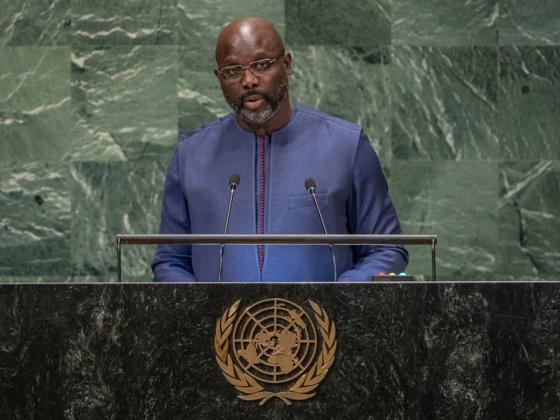Liberia: GoL Allocates US$1M for Agricultural Equipment, But…

President George Weah at the UN.
The administration of President George Weah has allotted US$1 million in the draft national budget to support the government’s drive towards mechanized farming.
The money, if approved by the legislature, will go toward the purchase of different kinds of agricultural equipment to help move the sector forward. While the country is rich in fertile lands, the lack of machinery and other agricultural equipment has constantly hindered the country's efforts to become food-sufficient.
But in recent times, the Ministry of Agriculture has strived to promote farm mechanization to improve agriculture with dozens of farmers and processors having received equipment to enhance production, under donors’ funding. It comes after the President pronounced that agriculture would be a priority, yet the sector is still heavily dependent on donor support.
The proposed national budget for the fiscal year 2022, which is currently before the Legislature for scrutiny, has a total of US$5,561,226 for agriculture which is less than 1% of the total national budget. As a result of low budgetary support, smallholder farmers are still faced with many challenges, despite monetary support from World Bank and other partners to address them.
2022 will be the President’s fifth year in office and the second time the budget for agriculture would have prioritized direct support for farmers. Much of the budgetary allocations for the Ministry of Agriculture go toward administrative and logistical costs. For instance, in the 2018/2019 budget, the government was able to approve US$1 million for the Rice sub-sector. Unfortunately, only US$40,000 was disbursed to the sector to promote rice production and processing.
Liberia spends close to US$200 million yearly for rice imports to ensure food security and a signatory of the Malabo Declaration for Food and Nutrition Security. This framework mandates every African government to allocate 10% of their total national budget annually for agriculture to accelerate growth.
Yet, both previous and present administrations in Liberia have failed to subscribe to this policy for more than a decade, thereby making the country continually depend greatly on other countries for its food supplies.
Finance and Development Minister, Samuel Tweah, once said that the government is unable to ensure compliance with the Malabo Declaration due to ‘competing national priorities. According to him, as long as the government has secured funding from partners, there is no need to consider an increment for agriculture in the national budget.
The Minister, however, mentioned that based on a plan by the government to use agriculture to drive the economy, the budget for agriculture could be improved. According to him, the government may improve the budget for agriculture as monies are accrued from the government’s salary harmonization program.
The minister’s assertion for a budget increment for agriculture-based salary harmonization perhaps comes from the President's pronouncement that monies from the salary harmonization process shall affect critical sectors of the economy. A few years ago, the government of President Weah introduced the salary harmonization program to do away with wasteful spending in the government. But, not much is known about monies saved by the government to affect critical sectors, such as agriculture.
Meanwhile, Mohammed Kamara, the President of the National Rice Federation of Liberia, has welcomed the proposal in the national budget for agriculture. Mr. Kamara added that, as the lawmakers deliberate on the budget, his organization is developing a proposal that will seek for funding to support the rice sector.
According to him, they would like to see the portion of the budget that relates to farm equipment be utilized by the rice sector.
“As the lawmakers discuss the budget, we are developing a proposal that seeks funding toward rice production,” he explained.
The Rice Federation President has also called on the government to make appropriations in the budget to address the issue of loan assistance for farmers. He said while he appreciates the Ministry of Agriculture’s current efforts to assist farmers with loans, more needs to be done. “If the country will reduce its reliance on rice imports, the government must make significant investments in the sector,” he stressed.
